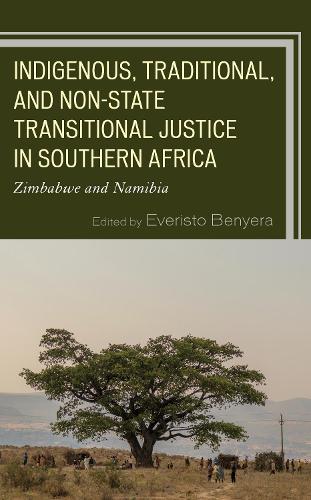
Indigenous, Traditional, and Non-State Transitional Justice in Southern Africa: Zimbabwe and Namibia
(Hardback)
Available Formats
Publishing Details
Indigenous, Traditional, and Non-State Transitional Justice in Southern Africa: Zimbabwe and Namibia
By (Author) Everisto Benyera
Contributions by Everisto Benyera
Contributions by Tapiwa Warikandwa
Contributions by Artwell Nhemachena
Contributions by Umali Saidi
Contributions by Shari Eppel
Contributions by Ruth Murambadoro
Contributions by Chenai G. Matshaka
Contributions by Tom Tom
Contributions by Clement Chipenda
Bloomsbury Publishing PLC
Lexington Books
13th September 2019
United States
Classifications
Professional and Scholarly
Non Fiction
African history
Physical Properties
Hardback
240
Width 159mm, Height 231mm, Spine 24mm
526g
Description
The book investigates the use of bottom-up, community based healing and peacebuilding approaches, focusing on their strengths and suggesting how they can be enhanced. The main contribution of the book is an ethnographic investigation of how post-conflict communities in parts of Southern Africa use their local resources to forge a future after mass violence. The way in which Namibias Herero and Zimbabwes Ndebele dealt with their respective genocides is be a major contribution of the book. The focus of the book is on two Southern African countries that never experienced institutionalized transitional justice as dispensed in post-apartheid South Africa via the famed Truth and Reconciliation Commission. We answer the question: how have communities healed and reconciled after the end of protracted violence and gross human rights abuses in Zimbabwe and Namibia We depart from statetist, top-down, one-size fits all approaches to transitional justice and investigate bottom-up approaches.
Reviews
Everisto Benyera is indeed carving a fine niche in the field of transitional justice in Africa and that his ideas frame this important volume of essays is inevitable. Bringing together insights from colonial genocide in Namibia and postcolonial violence in Zimbabwe, this volume enriches us conceptually, theoretically and empirically. -- Sabelo J. Ndlovu-Gatsheni, author of "The Decolonial Mandela: Peace, Justice and the Politics of Life" (2016) and "Epistemic Freedom in Africa: Deprovincialization and Decolonization" (2018)
This edited volume, written by a new generation of prominent scholars on African political transitions, deserves to be read by students, policymakers and everyone generally interested in contemporary processes of transitional justice in Southern Africa. Given some of the entanglements in the histories of violence in Zimbabwe and Namibia, this collection of essays offers fresh knowledge regarding non-state practices deployed to address the legacies of political violence in both countries. -- Victor Igreja, University of Southern Queensland, Toowoomba
Author Bio
Everisto Benyera is associate professor of African politics at the University of South Africa in Pretoria.
